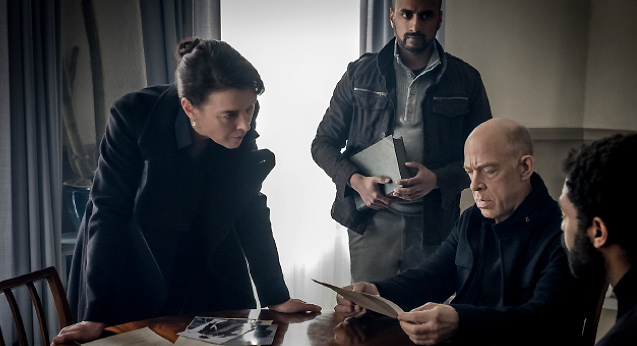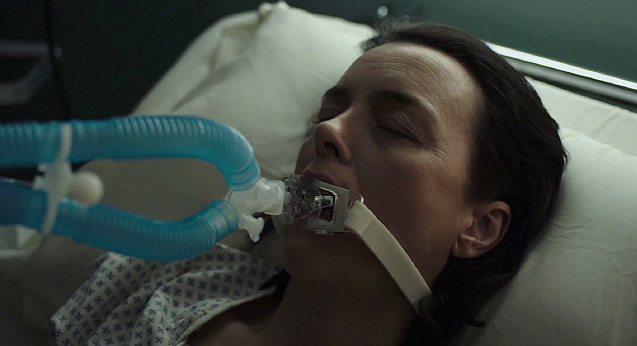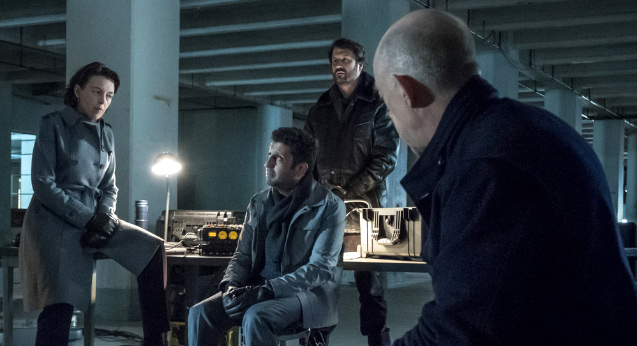Interview: Olivia Williams on her role opposite J.K. Simmons in Counterpart

The new NEON series Counterpart, streaming now, centres around the big, bold, concept that, thirty years ago, a parallel dimension containing every element of our world – including the people – was formed, and is accessible via a secret underground tunnel in Berlin.
There are suspicious relations between the parallel universes, which have evolved separately for three decades, resulting in more than few differences.
Oscar-winner J.K. Simmons (Whiplash, Justice League) plays Howard Silk, a meek intelligence grunt who discovers this massive secret when he meets his more successful counterpart from the “other side”, naturally also played by Simmons.
British actor Olivia Williams (The Sixth Sense, Rushmore) stars alongside Simmons as Howard’s beloved wife Emily, who is in a coma in ‘our’ dimension (the ‘Alpha’ world), but may actually be up and moving in the other one (the ‘Prime’ world).
Flicks sat down recently with Williams in Los Angeles, where she talked about what it’s like to star in a show where every actor will theoretically end up playing more than one version of their character.
FLICKS: What was it about ‘Counterpart’ that attracted you?
OLIVIA WILLIAMS: Well it wasn’t the script for the pilot, as you can probably gather. [Her character spends the whole first episode in a coma]. I took part on the basis that the writing was so brilliant. And the twist was such a fantastic brilliant, brilliant surprise. What it would be like to play that moment when you realise there’s another world weirdly like, and yet weirdly unlike, the one we know so well? I just thought of the possibilities of that, as an actor, psychologically, psychiatrically, playing the person who represents what might have been.
I don’t know if you’ve had that in your life, but I nearly married someone, and we made plans, we’d named our children and for a while when that marriage didn’t happen, I almost sort of grieved for the children that I’d almost seen running around.
What it would do to you psychologically to find out that your counterpart, your other person, something has befallen them that is awful? What form of empathy do you have for yourself and is that self-interest? Is that selfishness? Is that narcissism? It raises amazing philosophical questions that a therapist would have trouble sorting out. I just thought that was such a wonderful emotional psychological challenge, to work all that stuff out. I love a spy thriller. I love Berlin. I love that aesthetic.

How does one go about playing two different versions of a character?
You’re playing the same person, with different experiences. You can see it in someone’s face – there’s the face that’s been smiling and there’s the face that’s been crying. You get the frown lines and you get the smile lines and how do you put that into your body? The actual weight of experience on your shoulders. And how it affects how you move and walk and think. And ideas of what being a parent is or wanting to be a parent, and what that does to a marriage and what that does to a woman, to have a career. There are all these different options.
Does ‘Counterpart’ has something to say about the modern world?
That’s another thing I love about the series is that there are serious political parallels here. About walls going up, be they a wall through Berlin, a wall through the Ukraine, a wall across the bottom of the United States, and what it does to either people. Why do these two universes have to be adversarial? When I first read it I thought it could be lovely, they could all be friends, but then very quickly they’re spying on each other, they’re gathering information in a covert and suspicious way and I think that [creator/writer] Justin [Marks] is commenting on a lot of parallels in our society.
I think this idea of a “spy thriller”, it’s not past, it’s not Cold War. There was a guy in London who went and had sushi in Picadilly Circus, and was poisoned by polonium by one of Putin’s agents. It’s happening now. That was not some guy with a poison-tipped umbrella in the 70s. Polonium-poisoned sushi – we’re in that world.
The show isn’t historical and it’s not actual but it is important to me that there isn’t just silliness in the shows that I do. And there is a phenomenally thought-provoking and serious political parallel to be drawn from this if you want to, if that’s your bag. But if you like silly sci-fi, there’s a bit of that too.

This show is set in Berlin, and filmed in both Los Angeles and Germany. Does it feel like an American TV show to you?
I have over the years come to realise that the place around the camera is astoundingly international. Wherever you are, the silence, action… it’s without time or place. And I have filmed in Israel and South Africa and Madagascar, but that intimate thing that happens around the camera is gloriously without borders.
This show began with a two-season order, which is rare. Does that kind of security in the show’s future affect your performance?
I think it’s absolutely palpable. If you don’t know when the season’s going to end and you don’t know what’s going to happen to your character, anything you play has to be interpretable in any one of a million ways.
I moved from doing movies where you know the arc of your character to doing long-form television. I worked with Joss Whedon [on Dollhouse], where you have to be prepared to peel your face off and find out that you’re an alien at very short notice. I learned to leave everything so it could go either way, which I think is an unsatisfactory performance. So what was lovely about Justin is he didn’t treat us like the last people to know, so we could actually prepare a performance that could be read either way but which had an underlying arc of truth to it.
I’m not from the school of acting that thinks spontaneous is always good. I think that as an actor it takes time and research and empathy and imagination to create something of depth and layers and I think that’s what you get with this. We’ve had a chance to really think about what we’re doing and what we’re showing you.
This lovely piece of content is brought to you by NEON, where Counterpart is now available to stream. If you’re not on NZ’s best streaming service already, click here to start a 14-day free trial.


















